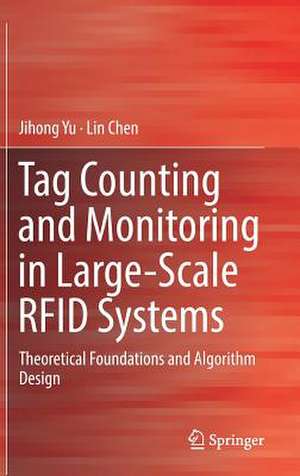Tag Counting and Monitoring in Large-Scale RFID Systems: Theoretical Foundations and Algorithm Design
Autor Jihong Yu, Lin Chenen Limba Engleză Hardback – 15 iun 2018
| Toate formatele și edițiile | Preț | Express |
|---|---|---|
| Paperback (1) | 379.68 lei 6-8 săpt. | |
| Springer International Publishing – 25 dec 2018 | 379.68 lei 6-8 săpt. | |
| Hardback (1) | 386.81 lei 6-8 săpt. | |
| Springer International Publishing – 15 iun 2018 | 386.81 lei 6-8 săpt. |
Preț: 386.81 lei
Nou
Puncte Express: 580
Preț estimativ în valută:
74.02€ • 80.38$ • 62.18£
74.02€ • 80.38$ • 62.18£
Carte tipărită la comandă
Livrare economică 22 aprilie-06 mai
Preluare comenzi: 021 569.72.76
Specificații
ISBN-13: 9783319919911
ISBN-10: 3319919911
Pagini: 138
Ilustrații: X, 135 p. 26 illus., 21 illus. in color.
Dimensiuni: 155 x 235 mm
Greutate: 0.39 kg
Ediția:1st ed. 2019
Editura: Springer International Publishing
Colecția Springer
Locul publicării:Cham, Switzerland
ISBN-10: 3319919911
Pagini: 138
Ilustrații: X, 135 p. 26 illus., 21 illus. in color.
Dimensiuni: 155 x 235 mm
Greutate: 0.39 kg
Ediția:1st ed. 2019
Editura: Springer International Publishing
Colecția Springer
Locul publicării:Cham, Switzerland
Cuprins
Chapter 1.Introduction.- Chapter 2.Stability Analysis of Frame Slotted Aloha Protocol.- Chapter 3.From Static to Dynamic Tag Population Estimation: An Extended Kalman Filter Perspective.- Chapter 4.Finding Needles in a Haystack: Missing Tag Detection in Large RFID Systems.- Chapter 5.On Missing Tag Detection in Multiple-group Multiple-region RFID Systems.- Chapter 6. Conclusion and Perspective.
Notă biografică
Lin Chen received his B.E. degree in Radio Engineering from Southeast University, China in 2002 and the Engineer Diploma and Ph.D. degree from Telecom Paris Tech, in 2005. He also holds a M.S. degree of Networking from the University of Paris 6. He currently works as associate professor in the department of computer science of the University of Paris-Sud. He serves as Chair of IEEE Special Interest Group on Green and Sustainable Networking and Computing with Cognition and Cooperation, IEEE Technical Committee on Green Communications and Computing. His main research interests include modeling and control for wireless networks, distributed algorithm design and game theory.
Jihong Yu received the B.E degree in communication engineering and M.E degree in communication and information systems from Chongqing University of Posts and Telecommunications, China, in 2010 and 2013, respectively, and the Ph.D. degree in computer science at the University of Paris-Sud, France, in 2016. He is currently a research fellow at Simon Fraser University, Canada. He serves as TPC member of IEEE ICNC 2018. His research interests include networking and RFID technologies.
Jihong Yu received the B.E degree in communication engineering and M.E degree in communication and information systems from Chongqing University of Posts and Telecommunications, China, in 2010 and 2013, respectively, and the Ph.D. degree in computer science at the University of Paris-Sud, France, in 2016. He is currently a research fellow at Simon Fraser University, Canada. He serves as TPC member of IEEE ICNC 2018. His research interests include networking and RFID technologies.
Textul de pe ultima copertă
This book provides a comprehensive treatment of the theoretical foundation and algorithmic tools necessary in the design of efficient tag counting and monitoring algorithms in emerging RFID systems. The book delivers an in-depth analysis on the following problems ranging from theoretical modeling and analysis, to practical algorithm design and optimization: Stability analysis of the frame slotted Aloha protocol, the de facto standard in RFID tag counting and identification; Tag population estimation in dynamic RFID systems; Missing tag event detection in the presence of unexpected tags; Missing tag event detection in multi-group multi-region RFID systems. The target readers are researchers and advanced-level engineering students interested in acquiring in-depth knowledge on the topic and on RFID systems and their applications.
Caracteristici
Provides foundations for the design of efficient tag management algorithms in practical large-scale RFID systems Introduces state-of-the-art applications of RFID technology in practical scenarios of IoT by counting dynamic tag population and detecting missing tags Presents a palette of tools which can be adapted for application in the control and optimization of RFID systems
